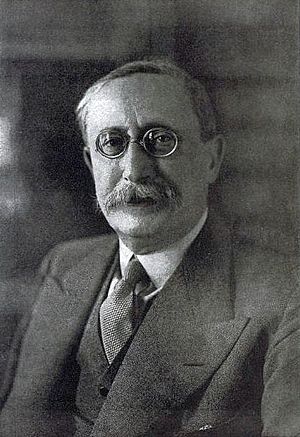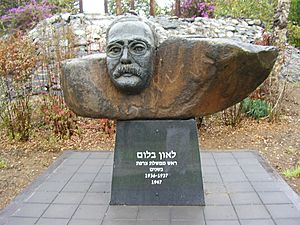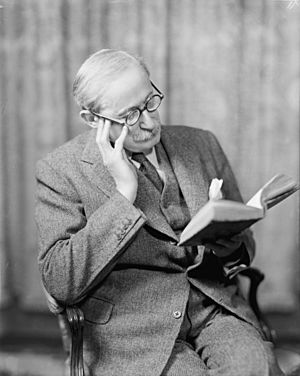Léon Blum facts for kids
Quick facts for kids
Léon Blum
|
|
|---|---|

Blum in 1936
|
|
| Prime Minister of France | |
| In office 16 December 1946 – 22 January 1947 |
|
| President | Vincent Auriol |
| Preceded by | Georges Bidault |
| Succeeded by | Paul Ramadier |
| In office 13 March 1938 – 10 April 1938 |
|
| President | Albert Lebrun |
| Deputy | Édouard Daladier |
| Preceded by | Camille Chautemps |
| Succeeded by | Édouard Daladier |
| In office 4 June 1936 – 22 June 1937 |
|
| President | Albert Lebrun |
| Deputy | Édouard Daladier |
| Preceded by | Albert Sarraut |
| Succeeded by | Camille Chautemps |
| Deputy Prime Minister of France | |
| In office 28 July 1948 – 5 September 1948 |
|
| President | Vincent Auriol |
| Prime Minister | André Marie |
| Preceded by | Vacant |
| Succeeded by | André Marie |
| In office 29 June 1937 – 18 January 1938 |
|
| Prime Minister | Camille Chautemps |
| Preceded by | Édouard Daladier |
| Succeeded by | Édouard Daladier |
| Personal details | |
| Born |
André Léon Blum
9 April 1872 Paris, France |
| Died | 30 March 1950 (aged 77) Jouy-en-Josas, France |
| Political party | French Section of the Workers' International |
| Signature | |
André Léon Blum (9 April 1872 – 30 March 1950) was an important French politician. He was a socialist and served as Prime Minister of France three times.
As a Jewish person, he was greatly affected by the Dreyfus affair in the late 1800s. He followed the ideas of the French Socialist leader Jean Jaurès. After Jaurès was killed in 1914, Blum became the new leader.
Even though he was Prime Minister for short periods, his time in office was very important. In 1936–37, he led the left-wing Popular Front government. During this time, he introduced many big changes to the economy and society. Blum decided that France would stay neutral in the Spanish Civil War (1936–1939). This was to stop the conflict from spreading into France. After leaving office in 1938, he spoke out against trying to make peace with Germany by giving in to their demands.
When Germany defeated France in 1940, Blum strongly opposed the new Vichy France government. He was put on trial by the Vichy government but was never found guilty. He was then sent to the Buchenwald concentration camp. After World War II, he returned to French politics. He helped create the French Fourth Republic before he passed away in 1950.
Contents
Who Was Léon Blum?
Early Life and Education
Léon Blum was born in Paris in 1872. His family was Jewish and had a successful business. His father, Abraham, was a merchant from Alsace.
In 1890, Blum started at the École Normale Supérieure, a famous school. He left after a year to study law at the University of Paris. He became both a lawyer and a writer who reviewed books.
Between 1905 and 1907, he wrote a book called Du Mariage (About Marriage). This book was very controversial at the time. It talked about how traditional marriage in the late 1800s focused on religion and money. It also stressed that women should remain virgins until marriage.
The powerful Catholic Church in France criticized his book. This happened after the separation of church and state in 1905. Today, many of Blum's ideas from the book are widely accepted. However, the book caused scandal for a long time, even after World War I.
First Steps in Politics
When he was young, Blum enjoyed reading nationalist writers. But he didn't show much interest in politics until the Dreyfus Affair in 1894. This event deeply affected many French Jews, including Blum. The Dreyfus Affair was a big scandal in France. It involved a Jewish army captain who was wrongly accused of treason.
Blum first got involved in the Affair in 1898. He helped defend Émile Zola, a writer who supported Dreyfus. This experience led him to meet the socialist leader Jean Jaurès, whom he greatly admired. Blum started writing for the socialist newspaper L'Humanité. He also joined the French Section of the Workers' International (SFIO), which was a socialist party. Soon, he became the party's main thinker.
In July 1914, just as World War I began, Jaurès was killed. Blum then became more active in the Socialist party's leadership. In August 1914, he became an assistant to the Socialist Minister of Public Works. In 1919, he was chosen to lead the party's main committee. He was also elected to the French National Assembly to represent Paris.
Blum believed that no dictatorship could be good. He was against joining the Comintern, an international communist organization. In 1920, he tried to stop a split in the party. This split was between those who supported the Russian Revolution of 1917 and those who didn't. But the radical members left and formed the French Communist Party. They also took the newspaper L'Humanité with them.
Blum led the SFIO party throughout the 1920s and 1930s. He was also the editor of the party's newspaper, Le Populaire.
Leading the Popular Front Government (1936–1937)
Forming the Government
Blum was elected as a representative for Narbonne in 1929, and again in 1932 and 1936. In 1934, things changed in politics. Adolf Hitler rose to power in Germany, and there were fascist riots in Paris. This made Joseph Stalin and the French Communists change their plans. In 1935, all the left and center parties joined together to form the Popular Front.
France was still struggling from the worldwide economic depression. Wages had dropped, and workers wanted changes. The Popular Front won a huge victory in June 1936. They won a strong majority of seats in the government. For the first time, the Socialists won more seats than the Radicals. They formed a strong team.
As the Socialist leader, Blum became Prime Minister of France. He was the first socialist to hold this job. His government included 20 Socialists, 13 Radicals, and two Socialist Republicans. The Communists supported the government but did not take any positions in it. For the first time, the government included three women in smaller roles, even though women could not yet vote.
New Laws for Workers
After the left-wing government was elected, two million workers went on strike. They took over many factories. These strikes happened on their own, without being organized. Businesses became worried and met secretly with Blum. He helped work out a deal for reforms. He then gave credit to the labor unions for these new agreements, called the Matignon Accords.
The new laws included:
- Workers gained the right to strike.
- Rules for collective bargaining were started.
- Workers got 12 days of paid annual leave.
- A 40-hour work week was made law (not counting overtime).
- Wages were raised (15% for the lowest-paid workers, 7% for others).
- Employers had to recognize shop stewards (worker representatives).
- There would be no punishment for workers who went on strike.
The government quickly passed these promised reforms. On June 11, the Chamber of Deputies voted for the 40-hour workweek, higher salaries for public workers, and two weeks of paid holidays. The Senate approved these laws within a week.
Blum convinced the workers to accept the pay raises and go back to work. Wages went up a lot, by 48 percent in two years. However, prices also went up by 46 percent. The 40-hour week made it hard for industries to adjust. This economic confusion slowed down efforts to build up France's military. Blum was worried by Germany's fast growth in weapons. He started a big plan to make more weapons quickly. The cost meant that some social reform programs had to be stopped.
Other Important Changes
By mid-August 1936, the government had also voted for:
- Creating a national Office du blé (Grain Board). This helped the government sell farm products at fair prices for farmers.
- Taking control of the arms industries (nationalization).
- Giving loans to small and medium-sized businesses.
- Raising the age for compulsory school attendance to 14 years.
- A large public works program (building projects).
The government also raised pay, pensions, and allowances for public workers and former soldiers. A sales tax from 1920, which the Left disliked, was removed. It was replaced by a production tax, which was seen as a tax on the maker, not the buyer.
Blum also shut down far-right groups that were like fascists. In return, the Popular Front faced strong opposition from right-wing groups. These groups often used hateful language against Blum and other Jewish ministers. A far-right group called Cagoule even set off bombs to try and disrupt the government.
The Spanish Civil War
The Spanish Civil War started in July 1936. It caused deep divisions in France. Blum decided that France would stay neutral instead of helping the Spanish Left-leaning Republicans. He was worried that helping might split his alliance with the centrist Radicals. He also feared it could cause a civil war in France itself.
His decision not to send weapons to Spain caused problems with the Communists. They wanted full support for the Second Spanish Republic. This difficult situation led Blum to resign in June 1937. All parts of the French left supported the Republican government in Madrid. The right-wing groups supported the Nationalist rebels. Blum's government was very divided. He chose a policy of non-intervention. He worked with Britain and 25 other countries to agree not to send weapons or volunteer soldiers to Spain. However, the Air Minister secretly sold warplanes to Madrid, going against the government's decision.
By 1938, the Republicans were losing badly. About 500,000 refugees crossed the border into France, where they were held in camps.
Attacks on Blum
On February 13, 1936, before he became Prime Minister, Blum was attacked. He was pulled from a car and almost beaten to death by the Camelots du Roi. This was a group of people who were against Jews and supported the monarchy. The main group they belonged to, the right-wing Action Française league, was dissolved by the government after this attack. This happened not long before the elections that brought Blum to power.
Blum was the first socialist and the first Jewish person to be Prime Minister of France. Because of this, he was especially hated by people who were antisemitic (against Jewish people).
During its short time, the Popular Front government passed important laws. These included the 40-hour week, 12 paid holidays for workers, and rules for collective bargaining. They also fully took control of the arms and military aviation industries. This last action accidentally caused problems with making weapons at a bad time, just three years before World War II began in September 1939. Blum also tried to pass laws to give more rights to the Arab people in Algeria. But this was stopped by colonial representatives in the government.
Second Government and Collapse
Blum was briefly Prime Minister again in March and April 1938. During this time, he managed to send heavy artillery and other needed military equipment to the Spanish Republicans. He could not form a stable government, and on April 10, 1938, his socialist government ended.
In foreign policy, his government was caught between the French Left's usual anti-war views and the growing danger from Nazi Germany. The government worked with Britain and declared war on Germany when it invaded Poland in September 1939. For eight months, there was little fighting, known as the Phoney War. Then, in the spring of 1940, the Germans invaded France and quickly defeated the French and British armies. The British Expeditionary Force left from Dunkirk, taking many French soldiers with them.
France surrendered and signed an armistice. This gave Germany full control over much of France. A small Vichy government controlled the rest of France, its colonies, and the French Navy. The same French Parliament that had supported the Popular Front since 1936 remained in power. It voted overwhelmingly to make Marshal Philippe Pétain a dictator and undo all the progress made by the French Third Republic.
Many historians believe the Popular Front failed in terms of its economy, foreign policy, and long-term stability. It created great excitement at first, but in the end, it did not meet its promises.
World War II and Imprisonment
When the Germans took over France in June 1940, Blum did not try to leave the country. This was despite the great danger he faced as a Jewish person and a socialist leader. Instead of fleeing, he went to southern France, but the French authorities ordered his arrest. Blum was imprisoned in Fort du Portalet in the Pyrenees mountains.
Blum was one of "The Vichy 80" – a small group of politicians who refused to give full power to Marshal Pétain. He was arrested in September and held until 1942. Then, he was put on trial in the Riom Trial. He was accused of treason for supposedly "weakening France's defenses" by sending weapons to Spain. The accusation claimed this left France's soldiers without heavy artillery against Nazi Germany.
Blum used the courtroom to strongly criticize the French military and pro-German politicians like Pierre Laval. The trial was so embarrassing for the Vichy government that the Germans ordered it to stop. They worried that Blum's strong performance would have a big impact on the public. He was then handed over to German control and imprisoned in Germany until 1945.
In April 1943, the German government imprisoned Blum in Buchenwald. As the war went badly for the Germans, they moved him to a section for high-ranking prisoners. They hoped to use him as a hostage in surrender talks. His future wife, Jeanne Adèle "Janot" Levylier, chose to come to the camp to live with him. They got married there.
As the Allied armies got closer to Buchenwald, Blum was moved to Dachau, near Munich. In late April 1945, he was moved again with other important prisoners to Tyrol. In the last weeks of the war, the Nazi government ordered him to be executed. However, the local authorities decided not to follow the order. Allied troops rescued Blum in May 1945. While in prison, he wrote his most famous book, À l'échelle humaine ("On a Human Scale").
His brother, René, who founded the Ballet de l'Opéra in Monte Carlo, was arrested in Paris in 1942. He was sent to Auschwitz, where he was killed in September 1942.
After the War
After the war, Léon Blum returned to politics. He was briefly Prime Minister again in the temporary government after the war. He believed that center-left and center-right parties should work together. This was to support the French Fourth Republic against other political groups.
Even though Blum's last government lasted less than five weeks, it made some important changes. These changes helped to lower the cost of living for people. Blum also served as Deputy Prime Minister for one month in 1948.
Blum also worked as an ambassador for a government loan mission to the United States. He was also the head of the French mission to UNESCO. He continued to write for Le Populaire until he passed away in Jouy-en-Josas, near Paris, on March 30, 1950. The kibbutz (a type of community) called Kfar Blum in northern Israel is named after him.
Books by Léon Blum
- Nouvelles conversations de Goethe avec Eckermann, 1901.
- Du mariage (About Marriage), 1907.
- Stendhal et le beylisme, 1914.
- Pour être socialiste (To Be Socialist), 1920.
- Bolchévisme et socialisme (Bolshevism and Socialism), 1927.
- Souvenirs sur l'Affaire (Memories of the Affair), 1935.
- La Réforme gouvernementale (Governmental Reform), 1936.
- À l'échelle humaine (On a Human Scale), 1945.
- L'Histoire jugera (History Will Judge), 1943.
- Le Dernier mois (The Last Month), 1946.
- Révolution socialiste ou révolution directoriale (Socialist Revolution or Directory Revolution), 1947.
- Discours politiques (Political Speeches), 1997.
Images for kids
See also
 In Spanish: Léon Blum para niños
In Spanish: Léon Blum para niños
 | Bessie Coleman |
 | Spann Watson |
 | Jill E. Brown |
 | Sherman W. White |



